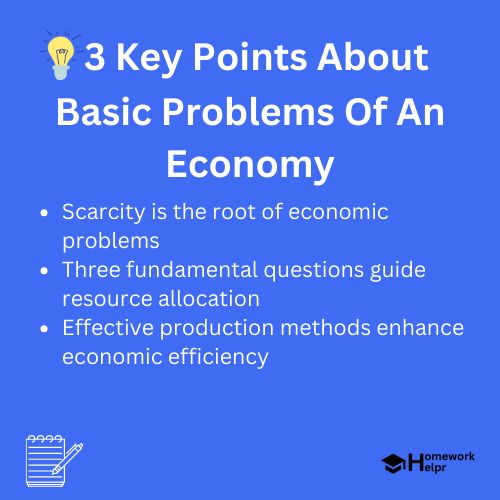📝 Summary
Every society faces certain fundamental problems arising from scarcity, which necessitates choices in the allocation of resources. Scarcity refers to the limited availability of resources compared to unlimited human wants. To address this dilemma, economies must answer three fundamental economic questions: What to produce?, How to produce?, and For whom to produce?. Each question affects production and distribution strategies, impacting overall efficiency and equity within the economy. Various approaches, such as regulatory policies, incentives, and education, can help tackle these economic challenges. Understanding these principles is crucial for informed decision-making that benefits society.
Basic Problems Of An Economy
Every society, regardless of its size or structure, faces certain fundamental problems that must be addressed to ensure the well-being and survival of its citizens. These problems arise from the basic economic challenge of scarcity, which necessitates choices about the allocation of resources. In this article, we will explore the basic problems of an economy-what they are, why they occur, and how they are resolved.
Understanding Scarcity
Scarcity is the root of all economic problems. It refers to the limited availability of resources compared to the unlimited desires of people. Since resources, such as land, labor, and capital, are finite, we cannot fulfill all human wants simultaneously. Different economies, from local communities to nations, face this severe limitation, making it imperative to decide how to best utilize the available resources.
Definition
Scarcity: The state of being in short supply; a situation in which resources are limited and unable to satisfy all human wants.
The Three Fundamental Economic Questions
To tackle the problem of scarcity, every economy must answer three fundamental questions:
- What to produce? This requires determining which goods and services should be created based on consumer demand.
- How to produce? This question addresses the methods and processes used to create goods, considering factors like technology and labor.
- For whom to produce? This involves deciding who will receive the goods and services produced, which can relate to wealth distribution and accessibility.
These questions govern the production and distribution of resources, ensuring that an economy functions efficiently. The answers can vary dramatically between different economic systems, such as capitalism, socialism, or mixed economies.
Example
Let’s say a country has to decide between producing more healthcare services or educational services. This decision depends on societal needs, implying choices regarding allocation and production methods.
What to Produce?
Making decisions about production requires an understanding of consumer preferences and market demands. If consumers are inclined toward technology products, an economy that focuses its efforts on such goods can thrive. Conversely, failing to gauge public interest can result in wasted resources and unsold products.
Different economies might utilize methods such as:
- Market Research: Collecting data to understand consumer trends.
- Government Intervention: Mandating production to meet urgent needs, such as in times of crisis.
Definition
Market Research: The process of gathering, analyzing, and interpreting information about a market, including information about the target market and consumers.
How to Produce?
Once society decides what to produce, the next challenge is determining how to produce these goods effectively. Factors such as technology, production techniques, and labor play critical roles in production methods. Economies that embrace innovation often excel because they can produce goods cheaper and faster than those relying on outdated methods.
Important considerations here include:
- Cost Efficiency: Minimizing costs while maximizing output.
- Environmental Sustainability: Using methods that do not harm the environment.
- Workforce Skills: Ensuring that labor is trained to meet production needs.

For Whom to Produce?
The final question addresses distribution and equity in society. Different economies approach this issue in varied ways. For instance, in a market-driven economy, wealthier consumers might have greater access to high-quality products, whereas in a more equitable system, the government may intervene to ensure equal access for all citizens.
Considerations for this question typically involve:
- Income Distribution: How wealth is distributed across society affects purchasing power.
- Social Needs: Addressing the requirements of marginalized groups.
Definition
Equity: The quality of being fair and impartial, often referring to fairness in the distribution of resources and opportunities.
Addressing Economic Problems
To tackle the fundamental economic problems, various strategies can be employed. These include government regulations, market mechanisms, and social programs. Here are some approaches to resolving economic challenges:
- Regulatory Policies: Governments can enforce regulations to ensure fair competition and consumer protection.
- Incentives: Providing financial incentives or subsidies to encourage desired production or consumption patterns.
- Education and Training: Equipping the workforce with necessary skills to increase productivity.
💡Did You Know?
The term “invisible hand,” coined by economist Adam Smith, refers to the self-regulating nature of the marketplace, where individuals seeking their own benefit inadvertently contribute to the overall economic well-being.
Conclusion
Understanding the basic problems of an economy is crucial for students and young thinkers alike. By grappling with concepts such as scarcity, production choices, and distribution methods, they gain insights into how societies function and the importance of sound economic decisions. In summary, the questions that arise from scarcity shape every economy’s structure and influence the quality of life for individuals. Recognizing and addressing these basic economic problems is a foundational step toward understanding the complex world of economics.
As future leaders, thinkers, and creators, students must appreciate how economic principles impact their lives. With knowledge and comprehension, they can contribute positively to society, making informed decisions that benefit everyone.
Related Questions on Basic Problems Of An Economy
What is scarcity?
Answer: Scarcity is the limited availability of resources compared to the unlimited desires of people.
What are the three fundamental economic questions?
Answer: The three questions are: What to produce? How to produce? and For whom to produce?.
Why is understanding economic problems important?
Answer: Understanding economic problems helps individuals make informed decisions that contribute positively to society.
How can governments address economic problems?
Answer: Governments can use regulatory policies, provide incentives, and support education and training to tackle economic challenges.
